ACM MemberNet - July 26, 2018
Welcome to the July 2018 edition of ACM MemberNet—Special Awards Banquet Edition.
The ACM Awards Banquet is an annual event recognizing technical excellence and outstanding service to the computing field. This year's banquet honoring the 2017 award recipients and newly inducted ACM Fellows was held at the Westin St. Francis in San Francisco on June 23.
ACM's awards celebrate our long tradition of honoring those whose contributions have impacted our world for the better in countless ways. These prestigious and internationally recognized honors are an integral part of ACM's mission to unite computing educators, researchers, and professionals to inspire dialogue, share resources, and address the field's challenges.
View our photo album of the banquet here.
July 26, 2018
AWARDS PRESENTED AT THE 2018 ACM AWARDS BANQUET:
- ACM A.M. Turing Award
- ACM Prize in Computing
- ACM - AAAI Allen Newell Award
- Software System Award
- Grace Murray Hopper Award
- Paris Kanellakis Theory and Practice Award
- Karl V. Karlstrom Outstanding Educator Award
- ACM Policy Award
- Distinguished Service Award
- Outstanding Contribution to ACM Award
- Athena Lecturer Award
- ACM Presidential Award
- 2017 ACM Fellows
- Doctoral Dissertation Award
- ACM Student Research Competition
NEW AWARD
ACM AWARD NOMINATIONS
ACM ADVANCED MEMBER GRADES
ACM AWARDS BANQUET
ACM A.M. Turing Award
The ACM A.M. Turing Award was presented to John L. Hennessy and David A. Patterson for pioneering a systematic, quantitative approach to the design and evaluation of computer architectures with enduring impact on the microprocessor industry.
Accompanied by a prize of $1,000,000, ACM's most prestigious award is given to recognize contributions of a technical nature which are of lasting and major technical importance to the computing field. Financial support of the A.M. Turing Award is provided by Google Inc.
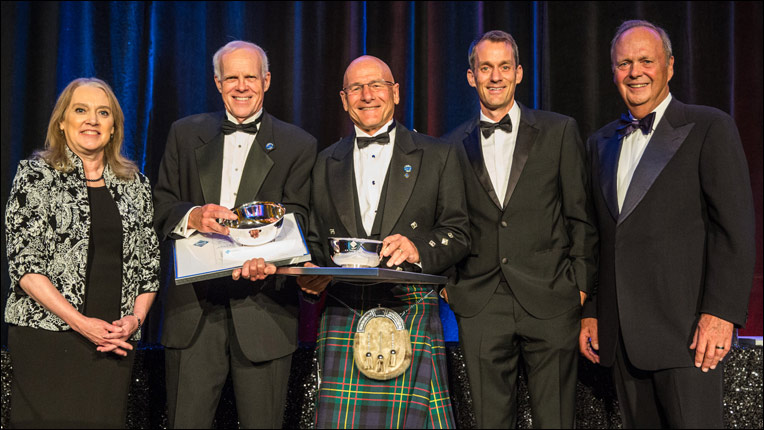
Turing Award recipients John Hennessy and David Patterson with ACM President (now CEO) Vicki L. Hanson, Google Senior Fellow Jeff Dean, and Awards Committee Co-Chair John White
ACM Prize in Computing
The ACM Prize in Computing was presented to Dina Katabi for creative contributions to wireless networking.
The ACM Prize in Computing (formerly the ACM - Infosys Foundation Award in the Computing Sciences) recognizes an early- to mid-career fundamental innovative contribution in computing that, through its depth, impact and broad implications, exemplifies the greatest achievements in the discipline. The award carries a prize of $250,000. Financial support is provided by Infosys.
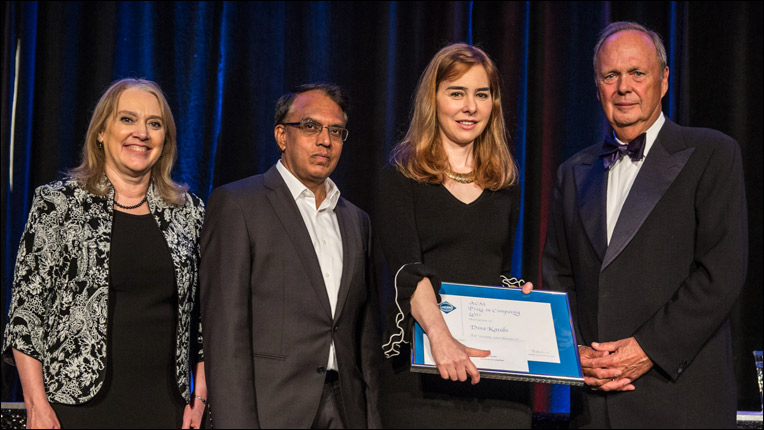
ACM Prize recipient Dina Katabi with Vicki L. Hanson, Tan Moorthy, Infosys Executive Vice President and Global Head of Education and Training, and John White
ACM - AAAI Allen Newell Award
The ACM - AAAI Allen Newell Award was presented to Margaret A. Boden for contributions to the philosophy and historiography of cognitive science and artificial intelligence, particularly in the study of human creativity.
The award is named for Allen Newell, a trailblazer in computer science research and education, and a founder of the artificial intelligence and cognitive science fields. The Newell Award is presented to individuals selected for career contributions that have breadth within computer science, or that bridge computer science and other disciplines. It is accompanied by a $10,000 prize provided by ACM and the Association for the Advancement of Artificial Intelligence, and by individual contributions.
Software System Award
The Software System Award was presented to Fernando Pérez, Brian E. Granger, Min Ragan-Kelley, Paul Ivanov, Thomas Kluyver, Jason Grout, Matthias Bussonnier, Damián Avila, Steven Silvester, Jonathan Frederic, Kyle Kelley, Jessica Hamrick, Carol Willing, Sylvain Corlay and Peter Parente (original members of the Project Jupyter Steering Council), for Project Jupyter, a broad collaboration that develops open source tools for interactive computing, with a language-agnostic design.
The Software System Award is presented to an institution or individuals recognized for developing a software system that has had a lasting influence, reflected in contributions to concepts, in commercial acceptance, or both. A prize of $35,000 accompanies the award, with financial support provided by IBM.
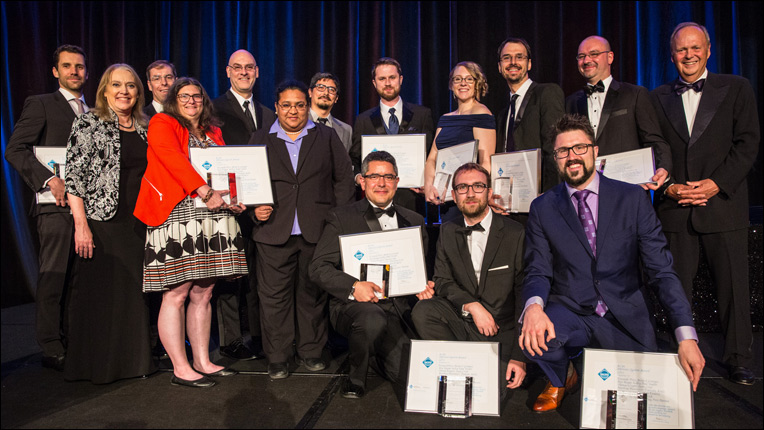
Software System Award recipients with Vicki L. Hanson and John White
Grace Murray Hopper Award
The Grace Murray Hopper Award was presented to Amanda Randles for developing HARVEY, a massively parallel circulatory simulation code capable of modeling the full human arterial system at subcellular resolution and fostering discoveries that will serve as a basis for improving the diagnosis, prevention, and treatment of human diseases.
The award is named for Admiral Grace Murray Hopper, a pioneer in software development whose work spanned programming languages, software development concepts, compiler validation, and data processing. The Hopper Award is presented to the outstanding young computer professional of the year, selected on the basis of a single recent major technical or service contribution. The candidate must have been 35 years of age or less at the time the qualifying contribution was made. A prize of $35,000 accompanies the award, with financial support provided by Microsoft.
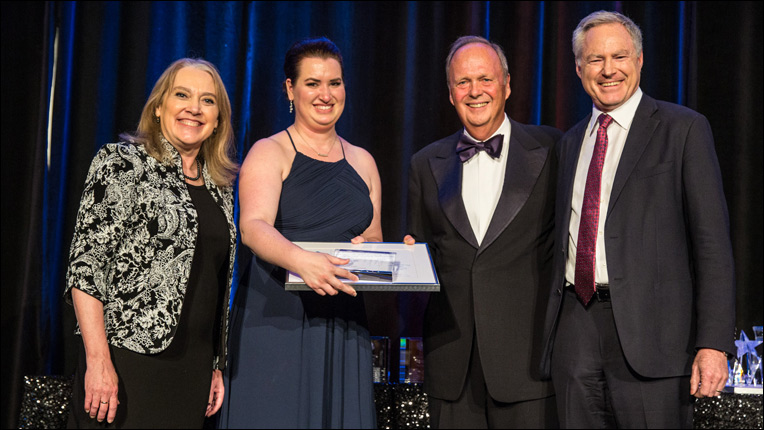
Hopper Award recipient Amanda Randles with Vicki L. Hanson, John White, and Eric Horvitz, Technical Fellow and Managing Director, Microsoft Research
Paris Kanellakis Theory and Practice Award
The Paris Kanellakis Theory and Practice Award was presented to Scott Shenker (who did not attend) for pioneering contributions to fair queueing in packet-switching networks, which had a major impact on modern practice in computer communication.
The award is named for Paris Christos Kanellakis, who, as a distinguished computer science theoretician and esteemed faculty member of Brown University, focused much of his work in the area of theoretical computer science, particularly the principles of database systems and logic. The Kanellakis Award honors specific theoretical accomplishments that have had a significant and demonstrable effect on the practice of computing. It is accompanied by a prize of $10,000 and is endowed by contributions from the Kanellakis family, and financial support by ACM's Special Interest Groups SIGACT, SIGDA, SIGMOD, and SIGPLAN, the ACM SIG Project Fund, and individual contributions.
Karl V. Karlstrom Outstanding Educator Award
The Karl V. Karlstrom Outstanding Educator Award was presented to Judith Gal-Ezer for her central role in developing a groundbreaking high school computer science curriculum; her outstanding computer science education research; and her extensive service to the education community.
The Karlstrom Award is presented annually to an outstanding educator who is appointed to a recognized educational baccalaureate institution; recognized for advancing new teaching methodologies; effecting new curriculum development or expansion in computer science and engineering; or making a significant contribution to ACM's educational mission. Those teachers with 10 years or less experience are given special consideration. The Karlstrom Award is accompanied by a prize of $10,000, with financial support provided by Pearson Education.
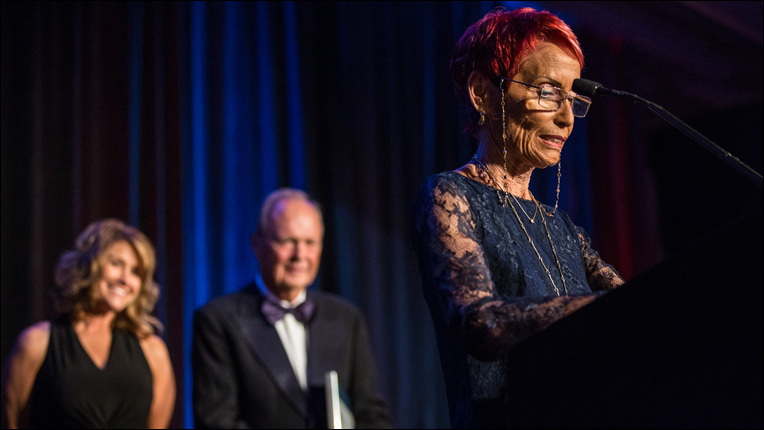
Karlstrom Award recipient Judith Gal-Ezer
ACM Policy Award
The ACM Policy Award was presented to William Wulf (who was unable to attend) for broad contributions bringing computing into the national agenda, leading computer scientists into public policy where his inspirational leadership promoted key national priorities including diversity and ethics.
The ACM Policy Award recognizes an individual or small group that had a significant positive impact on the formation or execution of public policy affecting computing or the computing community. This can be for education, service, or leadership in a technology postition; for establishing an innovative program in policy education or advice; for building the community or comunity resources in technology policy; or other notable policy activity. The biennial award is accompanied by a $10,000 prize.
Distinguished Service Award
The Distinguished Service Award was presented to Jan Cuny for the establishment and tireless promotion of projects and resulting organizations that have nationally transformed CS education by increasing and diversifying access to high-quality CS education.
The Distinguished Service Award is given on the basis of value and degree of service to the computing community. The contributions are not limited to service to the Association, and should include activities in other computer organizations and should emphasize contributions to the computing community at large.
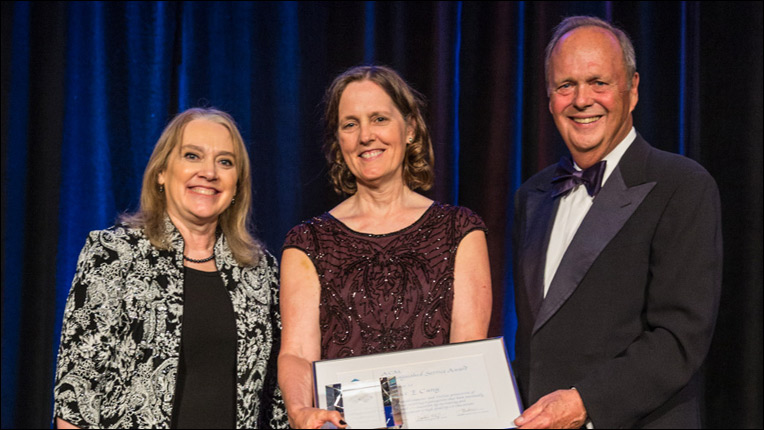
Distinguished Service Award recipient Jan Cuny with Vicki L. Hanson and John White
Outstanding Contribution to ACM Award
The Outstanding Contribution to ACM Award was presented to Steve Bourne for significant contributions to ACM, particularly for reaching out to practitioners through the development of the Practitioners Board and ACM Queue, and for his support of students worldwide through his engagement with, and support of, the ACM International Collegiate Programming Contest (ICPC).
The Outstanding Contribution to ACM Award recognizes outstanding service contributions to the Association. Candidates are selected based on the value and degree of service overall, and may be given to up to three individuals each year.
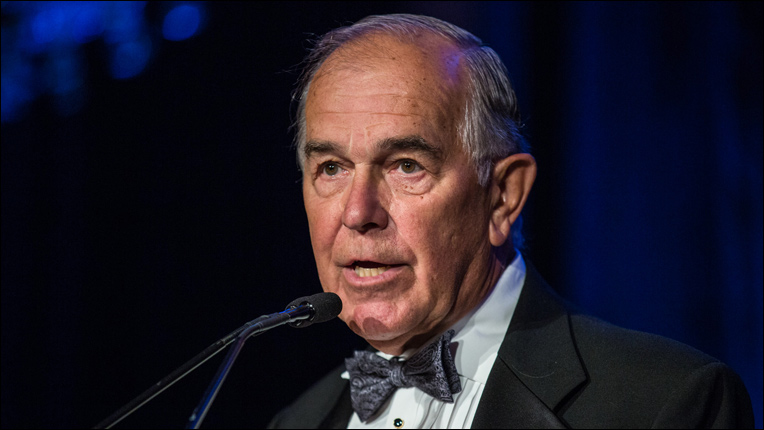
Outstanding Contribution Award recipient Steve Bourne
ACM Athena Lecturer Award
The ACM Athena Lecturer Award was presented to Andrea Goldsmith for contributions to the theory and practice of adaptive wireless communications and sustained transition of theoretical results into commercial technologies and industry standards.
The ACM Athena Lecturer Award recognition celebrates women researchers who have made fundamental contributions to computer science. The award includes a $25,000 honorarium provided by Google. The recipient gives an invited talk at a major ACM conference of her choice. From 2006 to 2016 this award was known as the ACM-W Athena Lecturer Award.
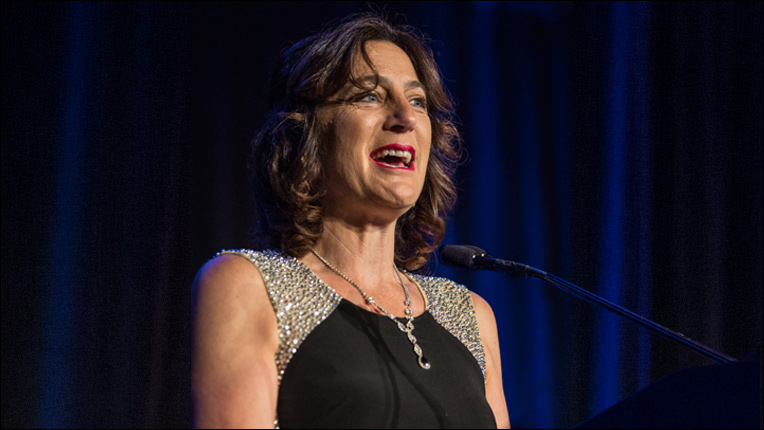
Athena Lecturer Award recipient Andrea Goldsmith
ACM Presidential Award
The ACM Presidential Award was presented to Donald Gotterbarn, Andrew McGettrick and Fabrizio Gagliardi for their time and talents in service to ACM.
The award is given at the discretion of the ACM President and recognizes leaders whose actions and achievements serve as paragons for our field.
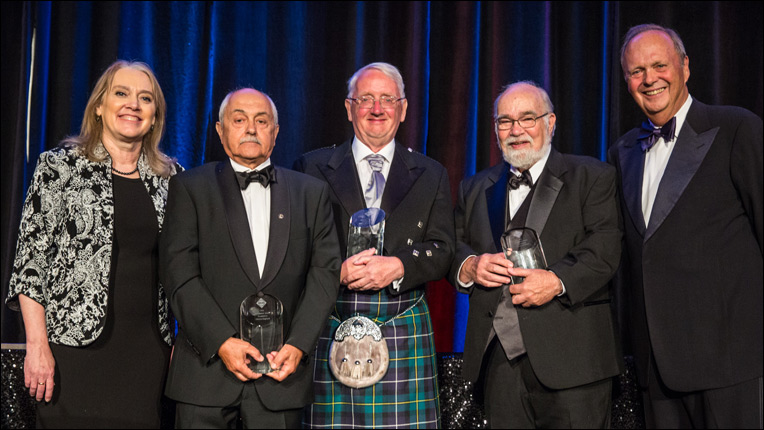
ACM Presidential Award recipients Fabrizio Gagliardi, Andrew McGettrick and Donald Gotterbarn with Vicki L. Hanson and John White
2017 ACM Fellows
The ACM Fellows Program was established in 1993 to recognize and honor outstanding ACM members for their achievements in computer science and information technology and for their significant contributions to the mission of ACM. The ACM Fellows serve as distinguished colleagues to whom ACM and its members look for guidance and leadership as the world of information technology evolves.
View the complete listing of ACM Fellows.
The 2017 Fellows are:
- Lars Birkedal
- Edouard Bugnion
- Margaret Burnett
- Shih-Fu Chang
- Edith Cohen
- Dorin Comaniciu
- Susan M. Dray
- Edward A. Fox
- Richard M. Fujimoto
- Shafi Goldwasser
- Carla P. Gomes
- Martin Grohe
- Aarti Gupta
- Venkatesan Guruswami
- Dan Gusfield
- Gregory D. Hager
- Steven Michael Hand
- Mor Harchol-Balter
- Laxmikant Kale
- Michael Kass
- Angelos Dennis Keromytis
- Carl Kesselman
- Edward Knightly
- Craig Knoblock
- Insup Lee
- Wenke Lee
- Li Erran Li
- Gabriel H. Loh
- Tomás Lozano-Pérez
- Clifford A. Lynch
- Yi Ma
- Andrew K. McCallum
- Silvio Micali
- Andreas Moshovos
- Gail C. Murphy
- Onur Mutlu
- Nuria Oliver
- Balaji Prabhakar
- Tal Rabin
- K. K. Ramakrishnan
- Ravi Ramamoorthi
- Yvonne Rogers
- Yong Rui
- Bernhard Schölkopf
- Steven M. Seitz
- Michael Sipser
- Anand Sivasubramaniam
- Mani B. Srivastava
- Alexander Vardy
- Geoffrey M. Voelker
- Martin D. F. Wong
- Qiang Yang
- ChengXiang Zhai
- Aidong Zhang
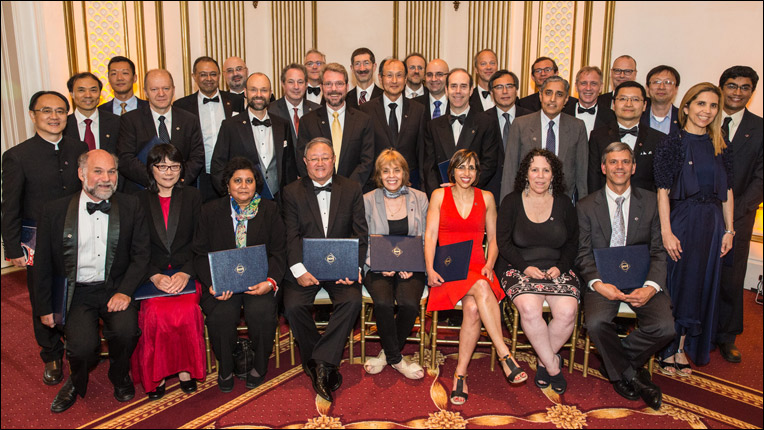
The 2017 ACM Fellows
Doctoral Dissertation Award
The Doctoral Dissertation Award was presented to Aviad Rubinstein of Stanford University for his dissertation, Hardness of Approximation Between P and NP.
Honorable Mentions were presented to Mohsen Ghaffari of ETH Zurich for his dissertation, Improved Distributed Algorithms for Fundamental Graph Problems, and to Stefanie Mueller of Massachusetts Institute of Technology for her dissertation, Interacting with Personal Fabrication Devices.
The Doctoral Dissertation Award is presented annually to the author(s) of the best doctoral dissertation(s) in computer science and engineering. The award is accompanied by a prize of $20,000 and the honorable mention is accompanied by a prize totaling $10,000. Financial sponsorship is provided by Google, Inc. Winning dissertations will be published in the ACM Digital Library as part of the ACM Books Series.
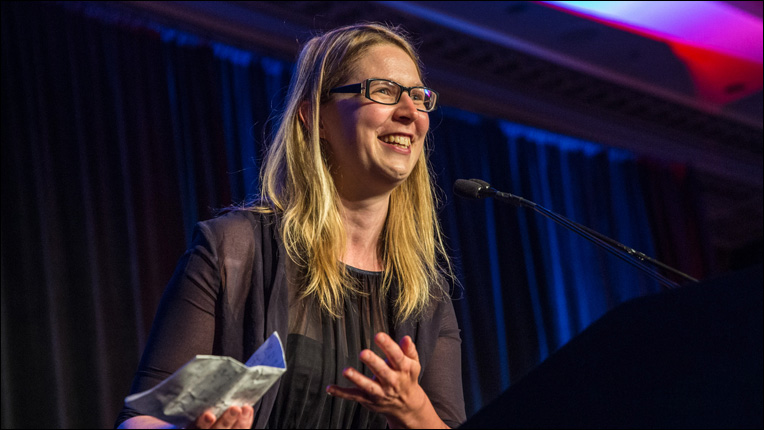
Doctoral Dissertation Award Honorable Mention recipient Stefanie Mueller
ACM Student Research Competition
The ACM Student Research Competition (SRC) represents a unique forum for ACM undergraduate and graduate student members to present their original research. Student winners from the SIGACCESS, SIGARCH, SIGCHI, SIGCOMM, SIGCSE, SIGDA, SIGDOC, SIGGRAPH, SIGHPC, SIGMOBILE, SIGMOD, SIGPLAN, SIGSAC, SIGSOFT and SIGSPATIAL Student Research Competitions held at these conferences advanced to compete in the Grand Finals where their research contributions were evaluated, via the web, by the ACM SRC committee. Financial sponsorship of $120,000 is provided by Microsoft per competition year. The finalists honored represent the best student research of the past year.
The winners of the 2017-2018 ACM SRC Grand Finals are:
Graduate Category:- 1st Place: Meng Li, University of Texas at Austin: "A Synergistic Framework for Hardware IP Privacy and Integrity Protection" (ICCAD 2017)
- 2nd Place: Jon Gjengset, MIT: "Xylem: dynamic, partially-stateful data-flow for high-performance Web applications" (SOSP 2017)
- 3rd Place: Daniel George, University of Illinois: "Deep Learning for Time-series Signal Processing for Real-time Gravitational Wave Detection and Parameter Estimation: Results with Real LIGO Data" (SC17)
- 1st Place: Tiancheng Sun, University of California, San Diego: "Attribute-preserving gamut mapping of measured BRDF" (SIGGRAPH 2017)
- 2nd Place: Patrick Thier, Institut fur Computersprachen Technische Universitat Wien: "Fast and Flexible Instruction Selection with Constraints" (CGO 2018)
- 3rd Place: Ayush Kohli, Southern Illinois University: "DecisionDroid: A Supervised Learning-Based System to Identify Cloned Android Applications" (FSE 2017)
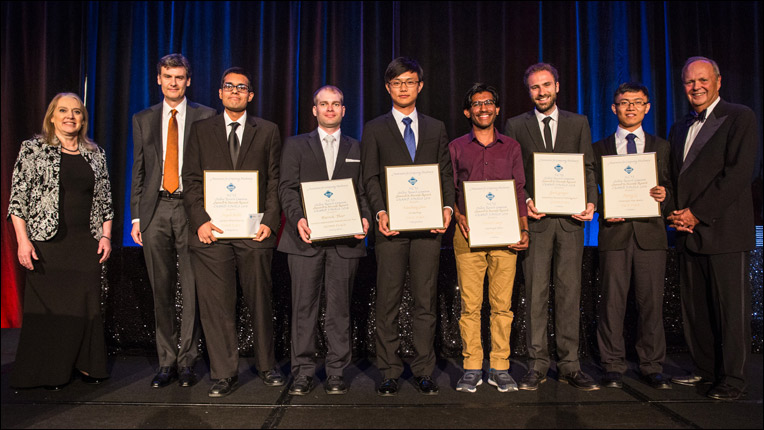
SRC Grand Finals winner with Vicki L. Hanson, Donald Kossmann, Microsoft Distinguished Scientist, and John White
NEW AWARD
ACM Announces Creation of Chuck Thacker Breakthrough in Computing Award
ACM has created a new major award to honor the late Charles P. “Chuck” Thacker, recipient of the 2009 ACM A.M. Turing Award. The award honors Thacker’s pioneering contributions to computing, considered by the community to have propelled the world in the early 1970s from a visionary idea to the reality of modern personal computing, providing people with an early glimpse of how computing would deeply influence us all. The award also celebrates Thacker’s long-term inspirational mentorship of generations of computer scientists. In addition to Turing, Thacker received several ACM awards, most recently the 2017 ACM-IEEE CS Eckert-Mauchly Award.
The award features a prize of $100,000, with financial support provided by Microsoft. Recipients of the Chuck Thacker Breakthrough in Computing Award will be invited to deliver an address, the ACM Breakthrough Lecture, to highlight the program at a major ACM conference of the recipient’s choice.
The award will be open to candidates who have made a surprising or disruptive leapfrog advance in computing ideas or technologies. Anyone may nominate and endorse a candidate, and nominations will be solicited from the computing community in general. Details forthcoming in future issues of MemberNet.
ACM AWARD NOMINATIONS
ACM Award Nomination Submission Procedures
Each year, ACM recognizes technical and professional achievements within the computing and information technology community through its celebrated Awards Program. ACM welcomes nominations for candidates whose work exemplifies the best and most influential contributions to our community, and society at large. ACM's award committees evaluate the contributions of candidates for various awards that span a spectrum of professional and technological accomplishments. For awards presented at the annual June banquet, the deadline for award nominations is January 15, 2019, with the exception of the deadline for the Doctoral Dissertation Award nominations which is October 31, 2018.
Please take a moment to consider those individuals in your community who may be suitable for nomination. Refer to the award nominations page for nomination guidelines and the complete listing of Award Subcommittee Chairs and Members.
ACM ADVANCED MEMBER GRADES
Advanced Member Grades Nominations Information
The Senior Member advanced grade of membership recognizes ACM members with at least 10 years of professional experience and 5 years of continuous ACM Professional membership. Nominations are accepted on a quarterly basis. The deadline for nominations is September 3.
The Distinguished Member designation recognizes ACM members with at least 15 years of professional experience and 5 years of continuous ACM Professional membership who have demonstrated significant accomplishments or made a significant impact on the computing field. The deadline for nominations is August 1.
Fellow is ACM's most prestigious member grade recognizing the top 1% of ACM members for their outstanding accomplishments in computing and information technology and/or outstanding service to ACM and the larger computing community. The deadline for nominations is September 7.
Copyright © 2018, ACM, Inc.